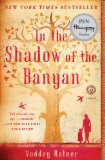Summary | Excerpt | Reviews | Beyond the book | Read-Alikes | Genres & Themes | Author Bio

Historical fiction novel The Last Gods of Indochine is told in dual third person narratives – one in 1921, viewed through the eyes and voyage of Jacquie Mouhot, a British woman of French origin; and the other in 1294 just before the start of the Khmer Kingdom's long decline, from the viewpoint of teenage friends, Paaku and Jarisi.
After volunteering during World War I, Jacquie is beset by nightmares, both of the horrors of the wards where she cared for wounded soldiers and, more recently, of terrifying images of human butchery, a young man wearing a loincloth, and a jungle boy from an ancient kingdom. Now en route to the French colony of Cambodia (which was the heart of the ancient Khmer Kingdom), she reads the journals of her grandfather, French explorer Henri Mouhot, and follows his path, thanks to a VIP invitation from a group hosting an upcoming colonial exposition in Marseille. "I feared entering a world where everyone is a stranger," she says. "The truth is, I am escaping from a world where everyone knew me too well."
In the second narrative, near the medieval village of the lotuses in the Khmer Empire, Paaku and Jarisi taunt girls playfully at the river. They are oblivious to the drama and intrigue of the royal palace until they are lured into participating in a festival event that will change their destinies, revealing Paaku's true origins and the curse that haunts the King. "This kingdom is desperate for miracles, and yet, I fear what may happen once miracles are given to them."
Samuel Ferrer creates mystery and intrigue through Jacquie's dream sequences and her grandfather's history, and as the novel unfolds we sense their connection to the events unfolding in the 13th century Khmer Kingdom, on the cusp of crisis. Through his female protagonist, Ferrer touches on the colonial European tendency to explore exotic outreaches, to want to name and claim territories and species, to live apart from local people, to ignore their customs and curses and see them as in some way lacking, but also to be enraptured by their art, architecture and affiliations. It is ironic that Jacquie escapes one fascination of man (war) only to become enmeshed in another (exploration of far flung colonies), although Ferrer is wildly imaginative in portraying her experience, avoiding colonial cliché.
While most of the characters and the story itself are fictional, many of the names referenced, including Jacquie's grandfather Henri Mouhot, and her romantic interest, the White Russian soldier and historian Victor Goloubew (1878-1945), are real life historical figures (See Beyond the Book). The novel takes a surprising turn as Jacquie theorizes to Victor, who is studying the bas-reliefs of Angkor Wat, how she knows the stories and characters contained within the stone carvings. Elements of magic realism add to the surreal nature of events in the novel's closing stages, which can feel a little out of place in what is otherwise a relatively conservative character.
Overall, The Last Gods of Indochine, which was nominated for The Man Asian Literary Prize, is a compelling and fascinating read. It succeeds in bringing the ancient Kingdom alive and allows us to imagine something of the society, superstitions and power structures inherent within it, which may also have contributed to bringing about its mysterious collapse. It left me wanting to know more about the history of the Kingdom and to visit its stunning monuments – as long as there isn't really a curse!
![]() This review
first ran in the April 19, 2017
issue of BookBrowse Recommends.
This review
first ran in the April 19, 2017
issue of BookBrowse Recommends.

If you liked The Last Gods of Indochine, try these:

by Vaddey Ratner
Published 2013
Displaying the author's extraordinary gift for language, In the Shadow of the Banyan is testament to the transcendent power of narrative and a brilliantly wrought tale of human resilience.

by Anita Amirrezvani
Published 2008
In 17th-century Persia, a young woman and her mother find themselves alone and without a dowry. Forced into a secret marriage to a wealthy man, the young woman is faced with a daunting decision: forsake her own dignity, or risk everything she has in an effort to create a new life.
Your guide toexceptional books
BookBrowse seeks out and recommends the best in contemporary fiction and nonfiction—books that not only engage and entertain but also deepen our understanding of ourselves and the world around us.